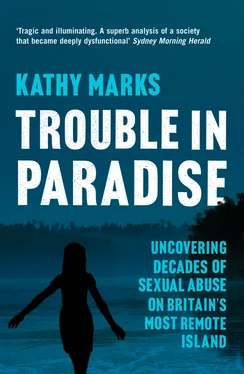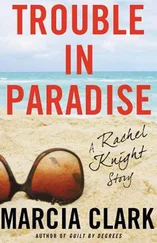Baroness Patricia Scotland, the British minister responsible for the Overseas Territories, had been following developments in the Pitcairn case closely. In May 2000 Governor Williams met with Scotland in London. He reported back that she wished the legal process to take its course, ‘no matter the cost or the implications for Pitcairn’s future’. ‘No question of an amnesty,’ Williams’ hurriedly faxed note to Wolstenholme concluded, with those words underlined.
In August 2000 Peter George and Robert Vinson, the detectives assigned to Operation Unique, returned to the Antipodes to start tracing the 20 women on their list: most of them lived in Australia or New Zealand, with a few in Britain and the United States. Accompanied by two New Zealand detectives, Karen Vaughan, the sharp-witted willowy blonde with child abuse expertise, and Paula Feast, police worked at a hectic pace—flying into a city, hiring a car and often just turning up on people’s doorsteps. Yet ‘every door we knocked on,’ George told me, ‘we got the same response … Every Pitcairn girl, and I mean every single one, a 100 per cent hit, had been a victim of sexual abuse to varying degrees.’ Vinson remembers, ‘We got disclosure after disclosure. It was staggering. It was like opening the floodgates for some of these women.’
The victims, by then in their late teens to late 40s, described incidents covering the whole gamut of abuse, from relatively minor assaults to violent rape. Some recalled blighted childhoods during which they were targeted by half a dozen or more Pitcairn men. The majority named more than one offender. In numerous instances, the abuse had started when they were three to five years old.
Most had kept their experiences to themselves, confiding in no one, not even their husbands. Now their husbands were hearing for the first time about the horrors of growing up as a girl on Pitcairn. Reliving it all was traumatic for the women, some of whom went into long-term counselling after telling their stories. Relationships and families were placed under enormous strain.
The first group of women told detectives about older victims, including friends and relatives, who had also been abused. Abandoning their 20-year time limit, police interviewed those women too, drawing a new line at 1960; before then, the relevant sexual offences law did not apply on the island.
By the end of the investigation, 31 victims—including two men—had spoken to police, naming 30 offenders, 27 of them native Pitcairners. Nearly every island male from the past three generations had been implicated; almost a third of those named were dead. Among the outsiders alleged to have taken part was a New Zealand teacher posted to Pitcairn in the 1960s, Albert Reeves.
Nearly a dozen women had made accusations against brothers, uncles or first cousins. But incest was not the only reason why Operation Unique at an early stage became, in Robert Vinson’s words, ‘very messy’. With every victim who was tracked down, the connections between those involved grew ever more excruciatingly tangled.
Belinda and Karen had been the first to disclose abuse. Next police spoke to Catherine, who claimed that Belinda’s father had raped her. Detectives then questioned a woman called Gillian, who—as well as recounting her own experiences—suggested that they contact two sisters, Geraldine and Rita. The pair told police that they had been raped as little girls. Their assailant, they said, was Gillian’s father.
Gillian’s uncle was allegedly an offender also, and so was her grandfather. Her first cousin was a victim. So was a relation of Geraldine’s and Rita’s. Their brother was said to be an abuser.
As the layers of secrecy that had enclosed Pitcairn for decades were peeled away, a picture emerged of almost systematic abuse. Many families allegedly contained both offenders and victims. How would those families cope with the fallout?
News travels fast along Pitcairn’s ‘coconut grapevine’. Just from the engine noise, the islanders can identify the driver of any quad bike that passes their house. They claim to know what everyone else is up to, at any hour of the day or night. ‘The jungle drum of Pitcairn is unbelievable,’ says Mary Maple, a former teacher on the island.
The grapevine extends across New Zealand, Australia and Norfolk Island, and during 2000 it buzzed with stories of English police questioning Pitcairn women. So when Peter George and Robert Vinson arrived at Pitcairn aboard a 48-foot yacht in September, no one was in any doubt as to why they had come.
After interviewing the island women, detectives were questioning the men. They had already spoken to suspects in New Zealand and Australia. Now it was the turn of those who lived on Pitcairn. Vinson and George set up video-recording equipment at the Lodge, where they were staying, and invited the men in one by one. While they were questioning Dave Brown, Len’s son and Olive’s brother, the power went off. Dave obligingly helped them to start up the generator, enabling them to resume his interview.
Despite the circumstances of their visit, the two Englishmen were received hospitably. ‘We were greeted with open arms, even by the accused,’ says Peter George, who recalls people ‘bringing us fish and freshly baked cakes … It was surreal.’
Beneath the surface, though, the community was in turmoil. When police began to ask questions, ‘everyone got the fright of their lives’, says Neville Tosen, the pastor. ‘Some of the men were quite clear that they were going to go to jail. They started cutting firewood for their mothers and wives, laying in stocks for a long period. They thought they were going to be taken off the island.’
Terry Young, who had promised his father, Sam, on his deathbed that he would look after his mother, Vula, was especially anxious. So was Dave. ‘I’m in trouble, no question,’ Dave told several people. ‘I’m going to jail … They’re going to lock me up and throw away the key.’ Even men who were not under scrutiny were alarmed. One older islander told an outsider, ‘They [the police] are going back 20 years. If they went back further, there’d be others.’
Elderly women who depended on their sons saw their whole future at risk, says Neville Tosen. ‘One mother was telling her son to come clean. Another was beside herself with worry. She said, “The police have come, and they’re going to take my boy away and hang him.”’
While Tosen had long had his suspicions, he was appalled to find out the scale of the alleged abuse. Above all, he was at a loss to comprehend how the older women, the mothers and grandmothers, could have allowed it to happen. It seemed obvious to him that they must have known. He and Rhonda spoke to the matriarchs. ‘We said to them, “Where were you when this was going on? You’re the elders of the island, surely you must be unhappy?” And they replied that nothing had changed. One of the grandmothers said, “We all went through it, it’s part of life on Pitcairn.” She said she couldn’t understand what all the fuss was about.’
The couple were feeling increasingly isolated. The communal satellite phone never seemed to be working when Tosen tried to reach Adventist regional headquarters. ‘We couldn’t get a message out of Pitcairn,’ he says. ‘We couldn’t even contact our kids. I also wrote letters to the Church administration, saying I was concerned about things on the island. They never arrived.’
Accompanying police on their visit was Eva Learner, an English social worker, who was sent out to support the locals and assess the impact of the investigation. In a report to the Foreign Office, Learner said that the men were ‘in [a] distinct state of shock and fear … very weepy … depressed and withdrawn’. Within the wider community, she encountered ‘general disbelief … about the nature and extent of the alleged abuse’: the islanders could not grasp ‘why the matters being investigated were of concern … or how they might be damaging to young women and children’. Mothers, Learner wrote, ‘professed difficulty in understanding that this had happened to their daughters’.
Читать дальше












